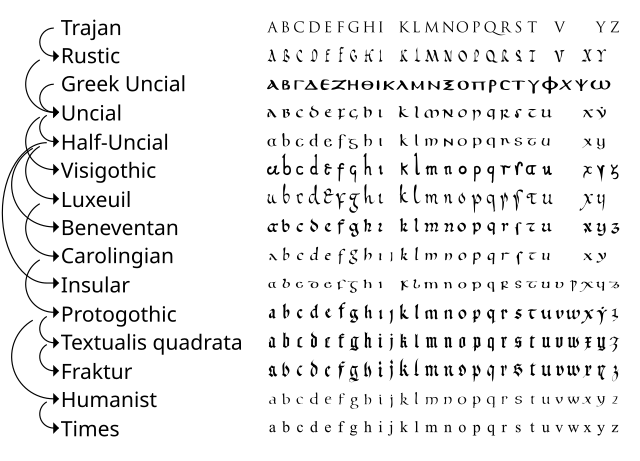Top Qs
Timeline
Chat
Perspective
Insular G
Form of the letter g in Insular script From Wikipedia, the free encyclopedia
Remove ads
Insular G (majuscule: Ᵹ, minuscule: ᵹ) is a form of the letter g somewhat resembling an ezh, used in the medieval insular script of Great Britain and Ireland. It was first used in the Roman Empire in Roman cursive, then it appeared in Irish half uncial (insular) script, and after it had passed into Old English, it developed into the Middle English letter yogh (Ȝ ȝ). Middle English, having reborrowed the familiar Carolingian g from the Continent, began to use the two forms of g as separate letters.
This article includes a list of references, related reading, or external links, but its sources remain unclear because it lacks inline citations. (September 2016) |



Remove ads
Letter
Summarize
Perspective

The lowercase insular g (ᵹ) was used in Irish linguistics as a phonetic character for [ɣ], and on this basis is encoded in the Phonetic Extensions block of Unicode 4.1 (March 2005) as U+1D79. Its capital (Ᵹ) was introduced in Unicode 5.1 (April 2008) at U+A77D. The insular |g| is one of several insular letters encoded into Unicode for phonetics use.[a] Few fonts will display all of the symbols, but more than a few will display the lowercase insular g (ᵹ) and the tironian et (⁊). Two fonts that support the other characters too are Junicode and Tehuti.

| Insular letters in Unicode[1][2] | ||||||||||||||||
| 0 | 1 | 2 | 3 | 4 | 5 | 6 | 7 | 8 | 9 | A | B | C | D | E | F | |
| U+1ACx | ◌ᫌ | ◌ᫍ | ◌ᫎ | |||||||||||||
| U+1D7x | ᵹ | |||||||||||||||
| U+1DDx | ◌ᷘ | |||||||||||||||
| U+204x | ⁊ | |||||||||||||||
| U+2E5x | ⹒ | |||||||||||||||
| U+A77x | Ꝺ | ꝺ | Ꝼ | ꝼ | Ᵹ | Ꝿ | ꝿ | |||||||||
| U+A78x | Ꞃ | ꞃ | Ꞅ | ꞅ | Ꞇ | ꞇ | ||||||||||
| U+A7Dx | Ꟑ | ꟑ | ||||||||||||||
Notes
| ||||||||||||||||
Remove ads
Turned insular g
A turned version of insular g (Ꝿ ꝿ) was used by William Pryce to designate the velar nasal ŋ.[1]
Notes
- Gaelic type, used to write Irish and Scottish Gaelic, is a typeface that has glyphs for ⟨G⟩ and ⟨g⟩ that typically resemble the phonetics insulular g, but uses U+0047 G LATIN CAPITAL LETTER G and U+0067 g LATIN SMALL LETTER G, not U+1D79 ᵹ LATIN SMALL LETTER INSULAR G and U+A77D Ᵹ LATIN CAPITAL LETTER INSULAR G.
References
External links
Wikiwand - on
Seamless Wikipedia browsing. On steroids.
Remove ads
